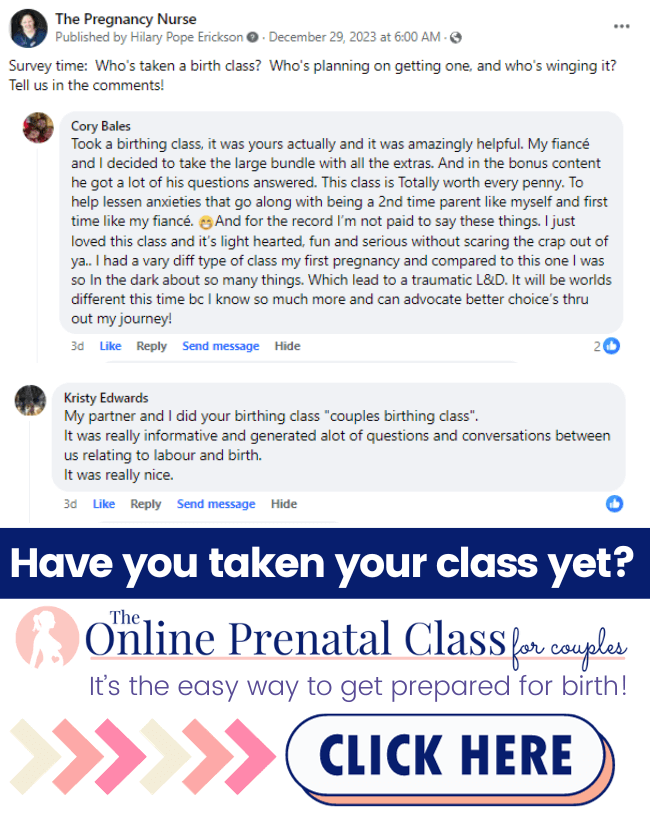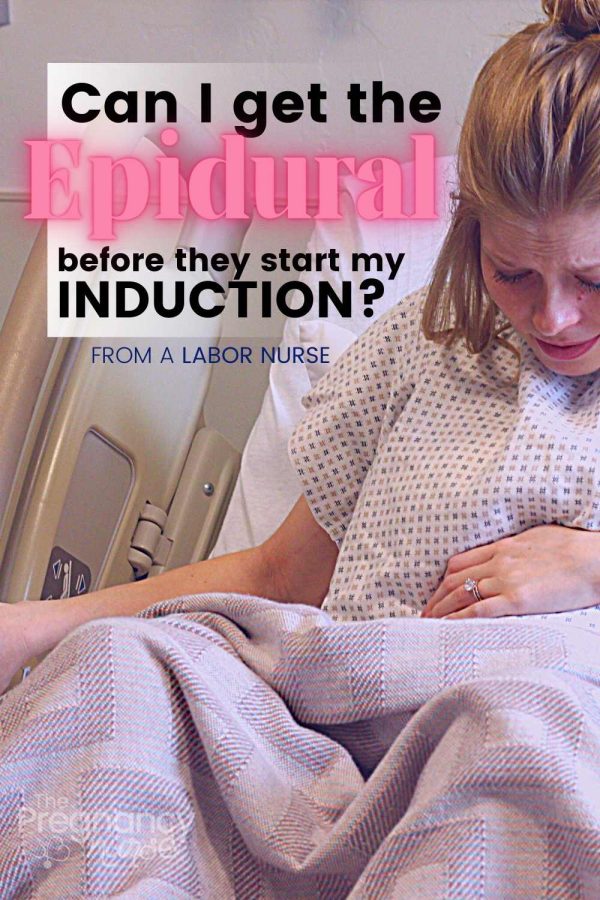📣 YOU are clearly getting prepared for pregnancy, birth & beyond — but do you wish your partner was more involved (looking for a teammate rather than just a cheerleader)? Couples love THIS! 💛🧡💚
It sounds like you’re considering an induction of labor around 37 weeks pregnant. How will it be different when they induce labour? In some ways it’s the same but I want to highlight what you should expect from your hospital stay.

Before we get going, how do I know so much about induction?
Hi — I’m Hilary — The Pregnancy Nurse 👩⚕️. I have been a nurse since 1997 and I have 20 years of OB nursing experience, I am also the curly head behind Pulling Curls and The Online Prenatal Class for Couples. 🩺 I have helped thousands of patients have early inductions and I think I’d qualify as an expert in this one. So, I’m excited to share my knowledge with you today.
If you’re still a day or two out from your induction (or not sure when it will happen), I’d recommend this. It makes it so much less scary. There’s a whole section (and mini class) on induction!
Here are a few things to expect at your early induction (these are true of any induction that’s before 39’ish weeks… so even if you’re earlier than 37 weeks these will be similar).
It may be real long
This is one of the biggest things about an early induction. Most often (although not always) when they start your induction of labor your cervix will be less favorable than it would be if they waited until closer to your due date.
Note: Of course, this isn’t always the case and I would encourage you to talk with your provider about what their plan of care is for you. Although they won’t give-out a lot of predictions, they likely do have a guess as to how long it will take.
So, you need to be prepared that your induction may take longer than you’re thinking in your head. Most likely 1-2 days.
So, prepare by bringing stuff to do. Favorites are:
- Card games
- Movies loaded onto a tablet to watch together
- A book to read
- Games to play on your phone
- Plenty of social media to scroll
And, prepare your mind that the bed won’t be super comfortable, and there may be a lot of rules you need to follow. And if you’re on your first baby it will likely be even longer.
**I sure sound like the bearer of bad news in this post, but I really want you to be prepared. Sometimes your doctor will skim over this in the hospital but I want to be sure you understand what you’re facing!
Note: I strongly believe 37 week inductions are often VERY necessary and can decrease your risk of stillbirth in many cases, but sometimes there is some wiggle room and you can talk with your provider about it to decide what is best for you.
I also REALLY believe in positive affirmations helping you to stay positive (and often creating positive outcomes). Grab my positive affirmations for your pregnancy and birth right here:
They may offer to break your water
I have seen this one a lot on social media — that doctors often come in to break your amniotic sac early with an induction. However, studies are showing that there doesn’t seem to be a big benefit of rupturing your membranes early on. There is always an increased risk of infection if your water is broken early on.
So, I would caution you on this one — I’d wait until you’re further in labor. And if you’re wondering HOW to refuse this (in a way that feels good) I actually talk about this scenario in my provider communication video in here.
Of course, if your water breaks naturally then it isn’t something you have a choice on.
It needs to have a REASON
Prior to 39 weeks of pregnancy (and in some places 40 weeks), the hospital will require your midwife or doctor to give a reason why you are being induced.
I have a whole post on the reasons they induce for labor at 37 weeks of pregnancy.
Note: There are 2 types of inductions, elective (meaning there is no medical reason, it is something either you or your provider are choosing), or medical. Prior to 39 weeks hospitals don’t allow elective inductions to be scheduled as they can get in trouble. I have a whole post on if you can ask to be induced at 37 weeks.
There’s lots of reasons why your obstetrician or midwife might schedule an induction this early, but you need to understand WHY you’re being induced. You also need to be clear that you’re OK with it. In some of those cases you could wait a week or so to be induced…. just depends on what you feel best after weighing the risks and the benefits.
The most common reasons for inducing labor between 37 and 42 weeks of pregnancy:
- High blood pressure or preeclampsia
- Uncontrolled gestational diabetes
- Issues with baby’s growth
- Issues with the amount of fluid in the uterus.
It is still your choice
This one sort of piggy-backs off what I said — but I want to always be clear with patients that it is your CHOICE to be induced.
First off, your provider is NOT going to pick you up and bring you to the hospital. But you really need to talk with them if you’re worried that this labor induction isn’t your best option. That’s what they are there for.
Don’t feel pushed into this, be aware that the choices are always yours. Be sure to use them wisely. Remember they may recommend inducing labor — but take it as a recommendation not an order (it’s nurse’s job to take orders, not patients).
There is always an option to wait for labor and see if it starts on its own, even if your provider prefers not to. Remember providers need to provide you with the:
- Risks of induction
- Benefits of being induced
- and Alternatives to induction
(This is called informed consent and they should do it on any procedure they’re recommending).
We talk a LOT about how to understand informed consent better in here.
You have a higher risk of cesarean section
You may have heard the ARRIVE trial showed that an induction at 39 weeks has LESS c-section risk, but I am not so sure at 37 weeks. Most of the studies (while retrospective, not actual trials done) show that you have a higher risk of a c-section when labor is induced (vs when you go into labor naturally).
At 37 weeks you have a couple of things going against you:
- You already have an issue, so if that issue flares up or causes a problem they will need to get baby out quickly through cesarean birth.
- Your cervix just isn’t as ready and may not open.
That doesn’t mean you’re going to have a c-section, just that you have a higher risk. Remember that a c-section is always a risk at any birth, which is why I have a whole expert chapter on it in here to get you prepared (people LOVE how specific that chapter is and end-up feeling so prepared if it ends-up happening).
If you or your baby is having issues it’s SO important to make sure you’re doing your kick counts daily, even if you have an induction scheduled. Learn how to do them (correctly) here:
They May Use Cervical Ripening Agents
When you have a cervix that is less than 3 cm or unfavorable they may use cervical ripening to get your cervix softer to start labor.
Most often these are:
- Medications: Like Cytotec (Misoprostol), Cervidil or Prostin Gel
- Mechanical: A foley bulb placed in your cervical opening.
These give much softer contractions and just help the cervix soften more before harder contractions take over to push baby into the birth canal. Those two methods can actually be used together. Your induction method will be chosen by your provider, so talk with them about their plan to get labor to start in your case.
It can be hard on the baby
Inductions sometimes cause faster and harder contractions than your body might naturally do.
If it does this, we can stop the medicine or give medicine to counteract it — but it can be harder on the baby. Sometimes your baby won’t tolerate it and in that case you would need a cesarean section.
BUT often we can wait, let baby calm down and try again. However, if it keeps happening it makes other options seem not as appealing if it is stressing baby out.
Some of the things we do to help baby perk up may seem scary (may have many nurses rush in your room). We talk about those very normal interventions and what they mean in here. These types of things are VERY normal with an induction, so being familiar with them helps a lot!
The Pains May Be Longer
As I said this labor may be really long. That doesn’t exactly mean you’ll be in hard contraction pain that whole time, but when labour starts you will be having those pains for longer.
It may mean less sleep and less ability to cope with the contractions.
You’re more likely to desire an epidural (so, if you’re scared of it — learn about it in here). And your natural pain management choices will be more difficult to use if you’re in labor longer. It’s not saying you can’t go natural, it’s just harder and you (again) need to be more prepared!
**Many people say that induced labor is usually more painful than “natural” labor but the ARRIVE trial showed that participants rated the pains the same between the two. As someone who has had both, I would say that early labor is worse in the hospital. It’s boring, you’re not as able to do activities you enjoy during this time. However, the pain itself felt very similar between the two.
It’s SO important to be prepared!
Having an early induction makes it even more important to be prepared. As we’ve discussed you have a higher risk of having a c-section, and there’s just going to be more choices (and interventions) during your day(s) in the hospital as they induce labor.
I like to give you the image of feeling burdened with every issue or question you’re not prepared by, and after time it sort of breaks you, and you just want it over with. Versus being prepared for things that are coming, and answers to questions in advance — you’re just not carrying that burden with you.
Getting prepared allows you to do just that. Come join me in The Online Prenatal Class for Couples where we get you both prepared for what is about to happen.
Now, all of this to say that your induction could still be just this bad at 42 weeks of pregnancy (or if you’re induced electively), it’s just hard to know until you get started. The good news it that once you’re giving birth a lot of these issues fade and you’re just so glad to have that baby there.
And, if you’re not quite sure you’re ready for the whole class, check out my free prenatal class. It’s your first step toward getting in the driver’s seat of your birth.








 IV During Labor – Do you NEED IV fluids in labor and delivery?
IV During Labor – Do you NEED IV fluids in labor and delivery?

I was induced at 36 weeks with my first. With my second child, my water broke at 37 weeks, and my third I had an induction at 38 weeks. It was smooth going and my labors were easy. I had no pain management with my second and third. I loved it when they broke my water. It got the show on the road. In fact, my doctor refused to break my water with my third. He was going to keep me in labor for over 24 hours. The head nurse and the pediatrician decided to break my water, and my daughter was out within 20 minutes. Thank goodness for them. The OB did not even make it back in time. All my babies were healthy and just fine.